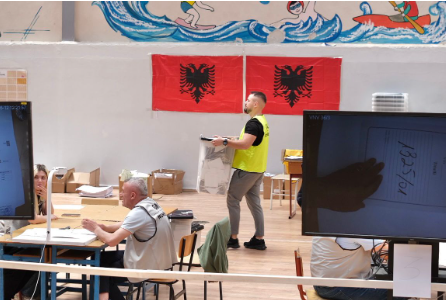The counting of diaspora ballots for Albania's May 11 elections has unveiled more than just numerical results—it has opened a Pandora’s box of questions, technical irregularities, and political symbolism. While the majority of diaspora votes have been counted across the country’s 12 districts, the process remains under intense scrutiny, particularly due to a significant and consistent anomaly: the near-total absence of Envelope B in 99% of the cases.
In Tirana, only 3,608 out of 42,402 diaspora envelopes have been counted so far, with the rest still under review. The preliminary outcomes are telling: political figures once central to Albania’s political landscape—Ilir Meta, Lulzim Basha, Dashamir Shehi, and Enkelejd Alibeaj—are registering negligible support from the diaspora. In contrast, PS candidates like Erion Braçe, Edlira Gonxhe, and Pandeli Majko emerge as the preferred voices abroad, alongside Ilir Alimehmeti and Jorida Tabaku from the Democratic Party (PD).
In Fier, the diaspora votes have now been fully tallied, reaffirming the Socialist Party’s dominance with the preservation of their 12th mandate. The closed-list candidates entering parliament from this district include Belinda Balluku, Petrit Malaj, Kiduina Zaka, Erjo Mile, and Ana Nako. The seven open-list winners are Ceno Klosi, Klevis Jahaj, Asfloral Haxhiu, Antoneta Dhima, Elton Korreshi, Zegjine Çaushi, and Dhimitër Kruti. Meanwhile, PD-ASHM secures four seats through Gazment Bardhi, Luan Baçi, Brunilda Haxhiu, and Saimir Korreshi. But beneath these statistics lies a numerical riddle that cannot be ignored: over 43,000 ballot papers have been counted, while the official registration of diaspora voters was only 42,000. The Central Election Commission (KQZ) has acknowledged this discrepancy but insists that no manipulation occurred. According to Chief Commissioner Ilirjan Celibashi, the excess is attributed to procedural mishaps—not deliberate fraud.
Two main scenarios have emerged:
- Thousands of diaspora voters returned their ballots using only Envelope A, omitting Envelope B, which is required for identity verification and scanning. These 2,696 cases were handled manually and documented individually.
- Some families submitted multiple ballots in a single Envelope B, confusing the one-ballot-per-envelope rule. For example, five family members might have enclosed their votes in one envelope, skewing the envelope count.
Despite these irregularities, KQZ states that all ballots were processed transparently, with each anomaly logged in an official protocol. The Commission’s online dashboard even includes footnotes clarifying the discrepancies between scanned envelopes and those received physically—an attempt at proactive transparency in a charged political climate.
At the Olympic Park in Tirana, counting of ballots from Greece—the largest diaspora bloc—has continued into the night. As of 12:00, a total of 198,459 envelopes had been registered. The Socialist Party holds a commanding lead among diaspora voters, with 121,490 votes (61.07%) to PD’s 46,893 (23.57%). The gap of over 73,000 votes underscores a broader trend: the PS maintains a nationwide lead of more than 326,000 votes over the PD, securing 83 mandates compared to the PD’s 50.
Still in play are the preferential votes for candidates in 10 districts, with tight internal PS races. In Tirana, Olta Xhaçka has edged ahead of Blerina Gjylameti in a critical gender quota race, while Ornaldo Rakipi maintains a slim lead over Xhemal Qefalia.
These margins could shape the final parliamentary composition and internal party
hierarchies. Outside the major parties, smaller movements are making quiet inroads. Nisma Shqipëria Bëhet has secured over 14,000 diaspora votes (7.55%), Mundësia follows with 5,864 votes (3.09%), while Lëvizja Bashkë and the Social Democratic Party remain below the 3% threshold.
In the end, the diaspora’s voice has spoken—but its clarity is muddied by procedural confusion, symbolic shifts, and the deep undercurrent of political mistrust. Is this a testament to engagement from afar, or a sign that Albania’s electoral architecture is not yet ready for its returning citizens?
The answer remains somewhere between the envelopes.
Written by our correspondent A.T.



